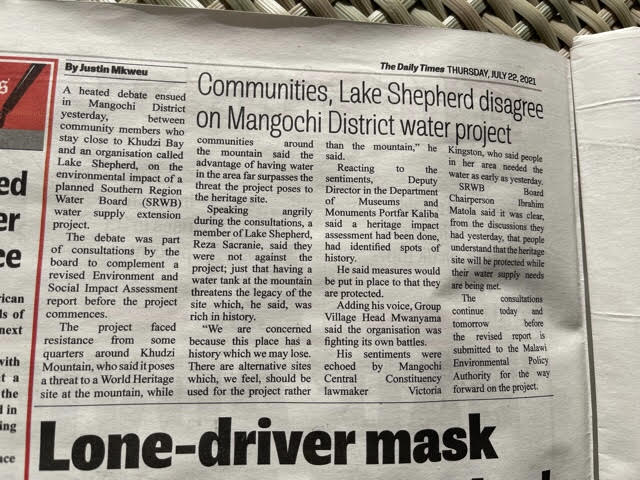Dear Friends, It has been almost two years since I have reported on our conservation work on lakes Malawi and Tanganyika. We all know why there was such a hiatus and I hope dearly that every one of you came through this (ongoing) pandemic unscathed or fully recovered. With travel to Africa greatly restricted for about 16 months there have been no “eyes” underwater to observe the situation regarding our threatened cichlids, but action is picking up in Malawi by local conservationists and sympathizers. Even though I have little to report from projects sponsored by our Fund, I recently received several important news items from Lake Malawi's defender, Reza Sacranie, that I like to share with you. |
|
First off, an undercover Malawian journalist found out how easy it was to fish with a non-licensed trawler using illegal nets at an illegal time in the southeastern arm of the lake. The whole procedure was explained as front-page news in Malawi’s number one newspaper, The Nation. The link to the newspaper’s website with the story is here but I also have it as a pdf file as I fear it will be removed soon under political pressure. When you read the story you should remember that one US dollar is about 800 Malawi Kwacha (MK). You’ll read that the Village Chief, head of the so-called Beach Village Committee, and the local fisheries boss are all three in on the deal allowing illegal (non-licensed) trawlers using illegal (small-meshed) nets to deplete the fish stocks in that part of the lake. Just for that particular village they allowed, besides the 11 licensed trawlers, about 40 extra illegal trawlers who each pay a daily bribe of $25 to the fisheries boss to sometimes make tens of thousands of dollars per trawler selling poached fish. The few men in power receive a daily $1000 and are selling out the fish of Lake Malawi and the livelihoods of the local fishermen. And that is just a single village. Read the article and you’ll be outraged. |
Another point of contention is the construction of a water intake site right in the National Park at Nkhudzi Hill. You can read about it here. And a video produced by a local agency can be viewed here. I’m afraid that the water pumped out of the lake is going to be used for other purposes than to supply “safe” drinking water for the local population. The authorities sounded concerned about the 92,000 locals who initially thought they would get the water for free (!), but the way this project was pushed through all kinds of regulations and restrictions—most of all building it inside the World Heritage Site!—suggests that buyers with deep pockets are waiting for the pumped water to use for other purposes than safe drinking water. Not only the fish but now also the lake’s water is up for grabs by some people in power. Reza, who has started the organization Lake Shepherd, is under continuous threats from the authorities embroiled in this water pumping scheme but now that Lake Shepherd’s views and comments have been publicized in the media he feels a bit safer for his family and employees. |
 The article in the Daily Times describing Reza being "angrily speaking" at the hearing for building a water pump site in Lake Malawi National Park The article in the Daily Times describing Reza being "angrily speaking" at the hearing for building a water pump site in Lake Malawi National Park |
On a more positive note it appears that Ripple Africa, led by Geoff Furber, has received funding from UNESCO to start working with the fishing communities along the southeastern arm of the lake on decentralized management. Their projects show to be very successful in the northern part of the lake (see previous reports) and now that they have received the funds are able to gradually implement their methods also in the southern part. |
I have no news to share from Lake Tanganyika but I will be at the lake in October and hope to report on developments from there later this year. I want to end this message to thank all of you who have contributed to the Fund, even through the pandemic, to conserve the cichlids in lakes Malawi and Tanganyika. Thank you! Ad Konings |
